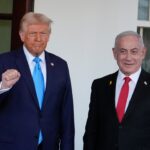
United States President Donald Trump has said that Israel cannot annex the occupied West Bank, a statement that puts him firmly at odds with Israeli Prime Minister Benjamin Netanyahu and members of his ultranationalist government who have been pressing for annexation of the Palestinian territory.
Trump made his surprise remarks while speaking to reporters on Thursday, ahead of Prime Minister Netanyahu’s arrival in the US to address the United Nations General Assembly in New York on Friday.
- list 1 of 4Israel’s Smotrich calls for phased Gaza annexation if Hamas does not disarm
- list 2 of 4Israel bristles as UK leads Western recognition of Palestine
- list 3 of 4Israel seeks permanent Gaza control, Jewish majority in West Bank: UN
- list 4 of 4Israel is guilty of war crimes, Palestine’s Abbas tells UN General Assembly
end of list
“ I will not allow Israel to annex the West Bank. Nope. I will not allow. It’s not gonna happen,” Trump said.
Asked whether he had discussed his plans to block any Israeli annexation attempts with Netanyahu, Trump was noncommittal.
“Yeah, but I’m not gonna allow it. Whether I spoke to him or not, I’m not allowing Israel to annex the West Bank. There’s been enough. It’s time to stop now, OK?” the US president said.
Trump did not offer details of what actions he would take to prevent the possible annexation of the occupied West Bank, and analysts questioned whether the notoriously capricious US leader would change his mind.
Speaking to Al Jazeera, Mouin Rabbani, an analyst and non-resident fellow at the Qatar-based Center for Conflict and Humanitarian Studies, said Trump’s statement was a “positive” development, but he questioned whether the President would “follow through”.
“One attaches value to Trump’s words at their own peril,” Rabbani said.
“So the question now becomes, is he going to ensure that Israel does not annex the West Bank, and if it does, what will he do about it? Will his mind perhaps be changed by another conversation that he has?”
Advertisement
Trump’s comments potentially place his administration on a collision course with the far-right Israeli government led by Netanyahu, members of which have made the annexation of the occupied West Bank and Gaza a formal political goal.
In July, Israeli lawmakers voted 71-to-13 in favour of a non-binding motion in the Knesset calling for the annexation of the West Bank.
The proposal was initially brought by Israel’s finance minister and far-right political leader, Bezalel Smotrich, who lives in an illegal settlement in the occupied West Bank and holds a position within Israel’s Ministry of Defence where he oversees the administration of illegal settlements on occupied Palestinian land.
Smotrich and other far-right members of Netanyahu’s governing coalition have also voiced staunch opposition to efforts to reach a deal to end Israel’s war on Gaza, even threatening to topple the government if an agreement is reached.
In advance of Australia, France, Britain, Canada, Portugal and other countries moving to recognise Palestinian statehood, Smotrich unveiled a plan allowing for the construction of thousands of homes in a controversial illegal settlement that bisects the occupied West Bank.
The massive settlement expansion on occupied land, when completed, “finally buries the idea of a Palestinian state, because there is nothing to recognise and no one to recognise”, he said in August.
“Anyone in the world who tries today to recognise a Palestinian state will receive an answer from us on the ground,” he added.
Israeli settlement in the occupied West Bank has been ongoing since 1967, stretching deep into Palestinian territory and carving up the landscape thanks to a network of roads and other infrastructure controlled by the Israeli government and military.
The International Court of Justice ruled in July 2024 that Israeli settlements in the occupied West Bank are illegal and must be discontinued and the land returned to Palestinians.
Israel has been a cornerstone of US foreign policy in the Middle East, and the Israeli government is heavily dependent on financial, military and intelligence support from the US to maintain its ongoing campaign in Gaza, the occupied West Bank and parts of Lebanon and Syria.
Any reversal of US policy could trigger a political crisis in Israel, particularly among the far-right parties who make up Netanyahu’s coalition government.
Referring to Gaza briefly on Thursday, Trump described the overall situation as “really bad, very bad”.
Advertisement
Despite suggesting a peace deal could happen “soon”, Trump offered no details or clarity except to say that “very, really good talks” had been held with leaders of Arab states and Netanyahu.
Earlier this week, Trump met with the leaders of Saudi Arabia, Qatar, the UAE, Egypt, Jordan, Turkiye, Indonesia and Pakistan on the sidelines of the UN General Assembly to discuss ending Israel’s ongoing military assault on Gaza.
British Caribbean News

